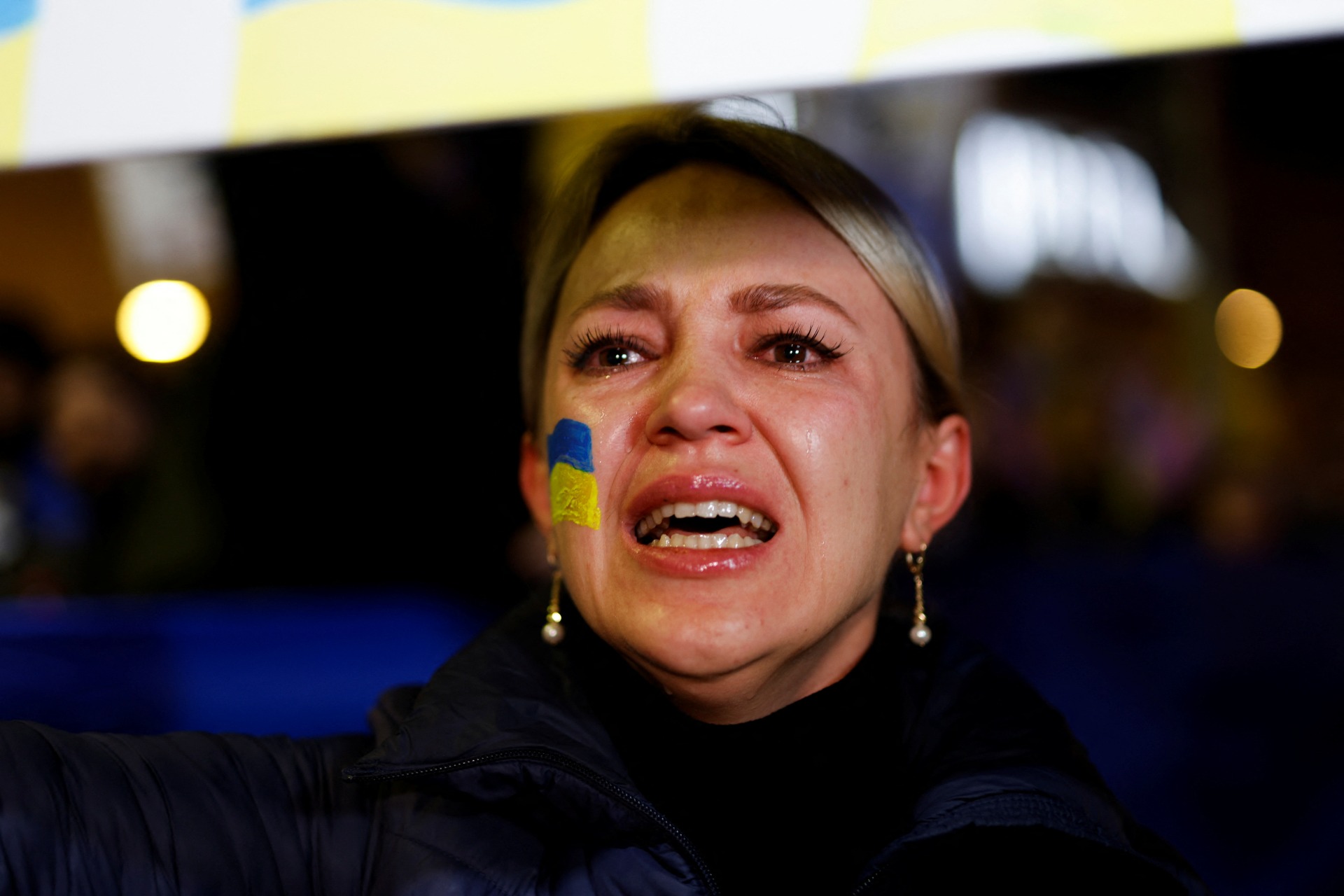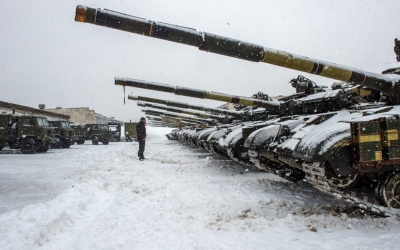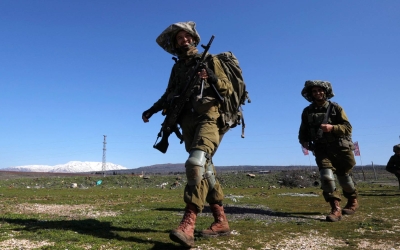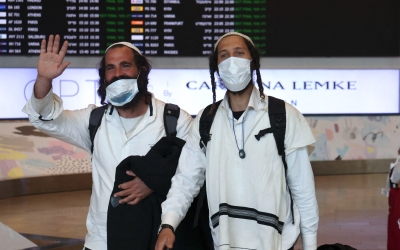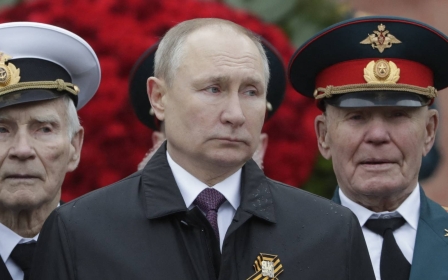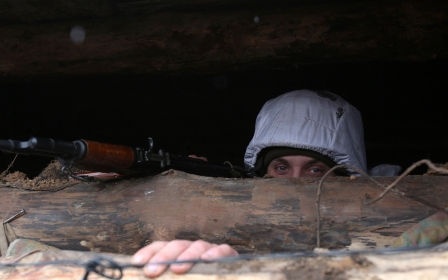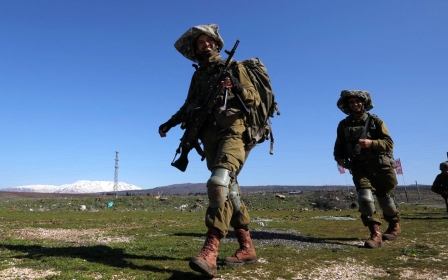Russia-Ukraine war: For Israel's Russian speakers conflict is painful and personal
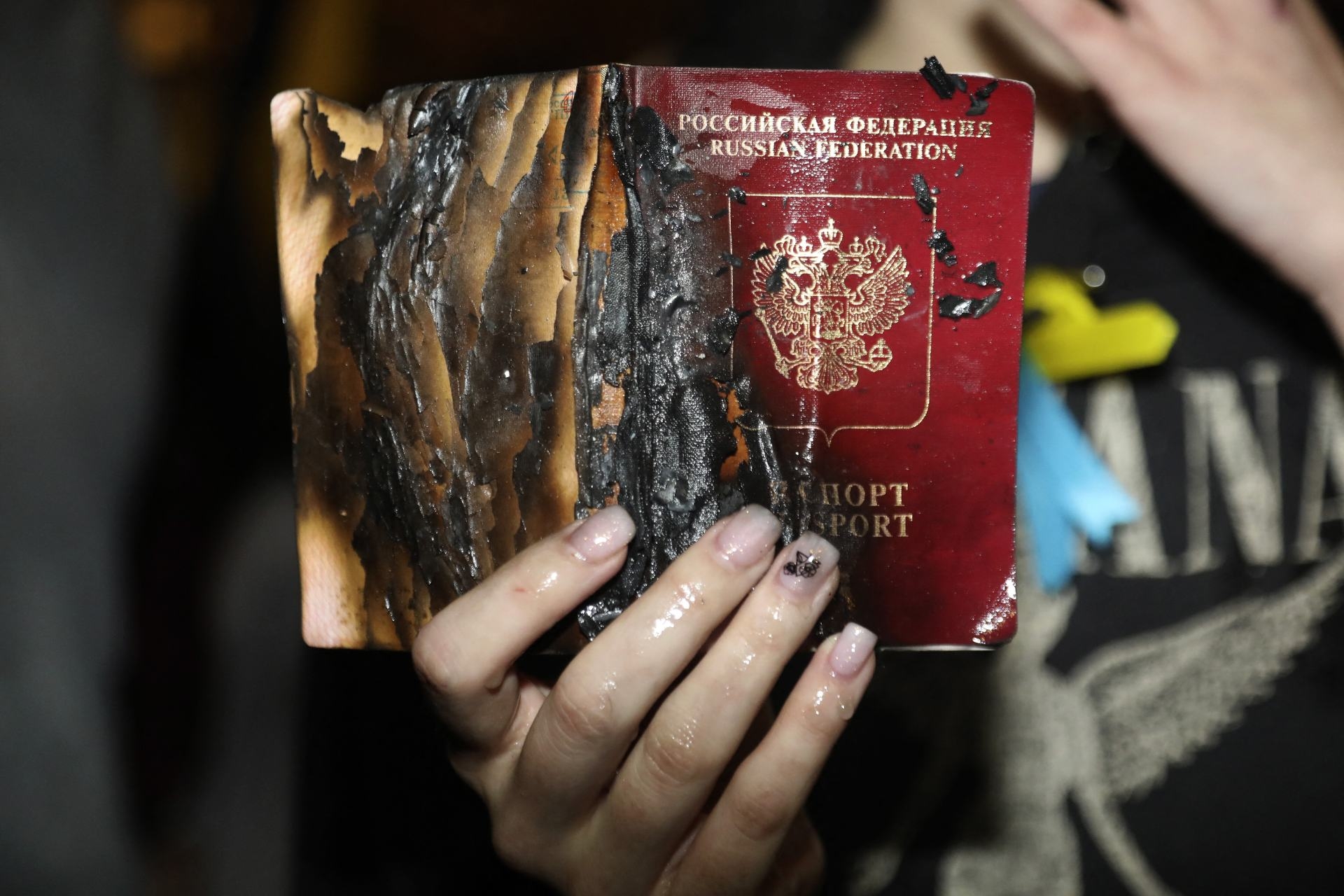
Ilia Akselrod is a successful stand-up comedian popular in Israel's large Russian-speaking community.
On Thursday night, Akselrod had been supposed to take the stage at a sold-out show in his hometown of Rishon LeZion, in the centre of Israel.
A few hours earlier, Russian forces had invaded Ukraine. Akselrod just could not do it. He cancelled the show.
"The sky above me is clear; I don't hear sirens nor explosives. Formally, everything is fine here. But following the news, I don't feel I can crack jokes today. I believe many in my audience don't want to laugh today either," he said.
Akselrod is among 1.2 million Israeli citizens – about 15 percent of the total population - who speak Russian.
New MEE newsletter: Jerusalem Dispatch
Sign up to get the latest insights and analysis on Israel-Palestine, alongside Turkey Unpacked and other MEE newsletters
For them, the war in Ukraine is not just a political issue, not just a moral issue, but also a personal issue. Throw in connections by marriage between Israelis and newcomers from the former Soviet bloc and this is a war that resonates like no other remote conflict.
Many of the younger generation of Russian speakers emigrated to Israel as teenagers alone, often leaving behind parents and extended families. Unlike many previous waves of immigration, they preserve a strong sentiment for their countries of origin, be it Russia, Ukraine or any other post-Soviet state.
'My homeland is being bombed'
That is the sentiment expressed by Alex Rif, a 36-year-old poet and social activist.
"My homeland is being bombed," she told MEE. "By some twist in history, it could have been me there. I feel physical pain. My heart is with Ukraine, but also with Russia where my brother lives.
"I got plenty of messages from Israelis expressing sympathy and solidarity; many volunteer to help in hosting immigrants from Ukraine, when they come.
"I also get messages condemning us for siding with Ukraine."
This emotional response and anxiety translates into rage. "Nazi" and "Hitler" are attributed to Putin all over social media and in interviews with helpless family members and friends.
Yet such sentiments could become a political problem for a country dependent on cooperation with the Russian leader, who has given Israel almost unlimited freedom to act in Syria and use of airspace effectively controlled by Russia.
The disparity between Israel's cautious official position and an angry population is an explosive mix, ignited by Ukraine's open condemnation of Israel's stance.
A small incident speaks volumes: angry Ukrainian soldiers refused to let an Israeli reporter covering the invasion to cross a roadblock near Kyiv.
According to the reporter's own account of the incident as told to Israel's Kan radio on Wednesday, the reason they gave was Israel's refusal to sell its Iron Dome air defence system to Ukraine for fear of angering Putin.
After a lengthy negotiation, they let her through.
Israelis from former Soviet states are now caught between what is perceived to be in Israeli security interests and their urge to punish the leader they now blame for their misery.
Israel's 'neighbour in the north'
As the invasion gathers pace, it becomes harder and harder for Israel to preserve Putin both as the understanding partner with mutual interests and the embodiment of evil at the same time.
He is, as Ukraine's ambassador to Israel, Yevgen Korniychuk, defined him cynically in a recent statement, "your neighbour in the north" - a reference to Russia's presence in Syria.
Nor has Israeli tiptoeing seemed to satisfy the Russian appetite for total commitment.
At a Wednesday meeting of the UN Security Council, the Russian deputy ambassador to the UN, Dmitri Poliansky, said Moscow was "concerned over Tel Aviv's announced plans for expanding settlement activity in the occupied Golan Heights".
A semi-official call for Israel to raise a moral voice came unexpectedly from Natan Sharansky. A former politician and minister in three governments, Sharansky is better known as a human rights activist who spent nine years in a Soviet prison.
In a Channel 12 interview on Thursday, Sharansky angrily reprimanded Israel's cautious policy and called for a moral stance condemning Putin.
He sounded very much like the Sharansky of old, the audacious human rights fighter, and much less like Sharansky the politician who kept quiet on human rights in his homeland of Israel.
On the other hand, Putin has gained unexpected support from some on the Israeli far right, in particular among former prime minister Benjamin Netanyahu's most ardent supporters.
One of the most vocal, Shimon Riklin, tweeted: "Another proof Putin and Russians are idiots. They do not listen to the Israeli left saying you make peace with your enemies. Putin thinks that who stations Nato at his doorstep is his enemy and you have to fight him. That is what you do with enemies - you crush them... remember this day. You witness the total collapse of the world view of the left."
Putin cannot expect better from Israelis these days, unless he listens to Channel 14, the far-right channel associated with Netanyahu.
Talking to the Israeli media, Korniychuk, Ukraine's ambassador, asked for assistance and weapons, referring to the 200,000 Jews and about 10,000 Israelis still residing in Ukraine.
Stuck in Ukraine
Talking to MEE, Israel's minister of diaspora affairs, Nachman Shai, said many of them had been reluctant to leave when danger still seemed to be remote and then it just became too late.
"It is a very sensitive issue," said Shai. "We cannot address citizens of another country and encourage them to leave. Not only can this approach feed antisemitism, it is simply not very effective.
'Jews there have a sense of affinity to their homeland and are not necessarily attracted to Israel. They have a life there, work, businesses, organisations, institutions'
- Nachman Shai, Israeli
minister of diaspora affairs
"Jews there have a sense of affinity to their homeland and are not necessarily attracted to Israel. They have a life there, work, businesses, organisations, institutions.
"With Israelis abroad, it is also a state of mind. They do not necessarily trust their government."
Israeli officials approached Poland, Moldova and Romania to provide an emergency land route out of Ukraine for Jews and Israelis in the case of a Russian invasion.
The Ministry of Foreign Affairs even approached Russia with the same request.
The director-general of the foreign ministry, Alon Ushpiz, called Russian Deputy Foreign Minister Mikhail Bogdanov to ensure that, if Russia does invade, it will have the ability to open humanitarian corridors to evacuate citizens by land to neighbouring countries.
This bold move did not go down well with the Ukrainians. Israel's ambassador to Kyiv, Michael Brodsky, was summoned to the Ukrainian foreign ministry, where he explained the call had been intended to express Israeli concern about the safety of Israeli citizens and diplomats and to call for de-escalation.
The efforts did not pay off. Ukrainian Jews had no intention of leaving their country; Israeli citizens felt they could handle the situation.
'Totally unprepared'
Only 48 families engaged in the tedious process of immigration arrived last week; about 3,000 Israelis studying or working in Ukraine (out of about 15,000) took advantage of the assistance offered and left on time.
Inbar Mor, a 28-year-old Israeli entrepreneur was one of the few. Mor, daughter to a family of veteran immigrants from the former Soviet Union, was born and raised in Ashdod in southern Israel.
A year-and-a-half ago she joined her husband in Kyiv, where they run an international cosmetics company.
When the winds of war started to blow over Kyiv, she drew on her life experience in Ashdod, a target of rocket attacks by Palestinian militants during wars in Gaza, and went looking for shelters. She found none.
"I realised they are totally unprepared, and reached a conclusion," she told MEE.
"It was a tough decision to leave behind the business and the friends we made. In a way, you also develop a sense of solidarity with the place and the people who surround you.
"Now I spend time talking to friends I left behind. Some managed to leave Kyiv, some tried to leave by car only to realise it was no longer possible and they had to make the long journey by foot."
This article is available in French on Middle East Eye French edition.
Middle East Eye delivers independent and unrivalled coverage and analysis of the Middle East, North Africa and beyond. To learn more about republishing this content and the associated fees, please fill out this form. More about MEE can be found here.


